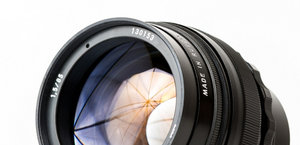Voigtlander Nokton 10.5 mm f/0.95
5. Chromatic and spherical aberration
Chromatic aberration
The longitudinal chromatic aberration is corrected quite well. Its small influence on the colouring of defocused images might be noticed at the maximum relative aperture but on stopping down the aperture by 1-2 EV that problem disappears practically completely.
 |
Please Support UsIf you enjoy our reviews and articles, and you want us to continue our work please, support our website by donating through PayPal. The funds are going to be used for paying our editorial team, renting servers, and equipping our testing studio; only that way we will be able to continue providing you interesting content for free. |
- - - - - - - - - - - - - - - - - - - - - - - - - - - - - - - - - - - - - - - - - - - - - - - -
There are no serious reservations concerning the lateral chromatic aberration correction either – a correlation between its values and aperture values presents a graph below.

The results range from 0.09% to almost 0.11% and are considered medium by us.
| Olympus E-PL1, f/0.95 | Olympus E-PL1, f/4.0 |

|

|
Spherical aberration
It is obvious the Nokton 0.95/10.5 has problems with the spherical aberration correction. First, it shows a distinct “focus shift” effect. In crops presented at the beginning of this chapter you see it very clearly - after passing from f/0.95 to f/2.0 the depth of field shifts significantly toward the longer distance.
The circles created by defocusing light points don’t leave any doubts either. In front of the focus you get a noticeable light rim and behind the focus the edges are very soft, merging smoothly with the background. It is a classic symptom of spherical aberration.
| Olympus E-M10, f/0.95, in front of | Olympus E-M10, f/0.95, behind |

|

|






